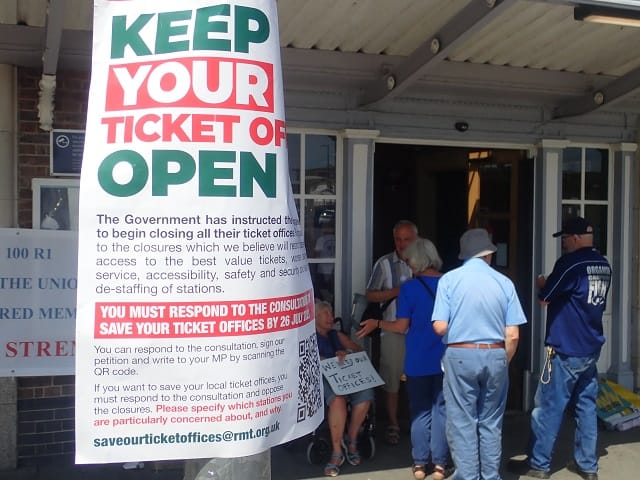
Rail union TSSA has said it is delighted the government has admitted defeat over plans to close almost all railways ticket offices across England.
Train operators, including Southeastern, had launched public and employee consultations over proposals to close the ticket offices in all but the busiest stations. It provoked a campaign and widespread demonstrations, including in Thanet.
TSSA – the union representing rail ticket office workers for over 125 years – has been at the forefront of a sustained campaign to ‘Save Ticket Offices’.
The union’s campaign resulted in the widespread condemnation of the proposals by passengers and disability, women’s and pensioner groups, drawing 750,000 responses – the largest ever for a public consultation.
Transport Secretary, Mark Harper, has now told train companies to withdraw the plans after both Transport Focus and London TravelWatch today formally objected to the proposals.
TSSA General Secretary, Maryam Eslamdoust, said: “Our union has fought tooth and nail for many months to stop what would have been a catastrophe for our railways.
“We are delighted that the government has admitted defeat and scrapped these wrongheaded plans. It shows the power of our union and of the great British public in making sure these planned closures have now reached the end of the line.
“Though the Transport Secretary, Mark Harper, has acted today frankly none of this need have happened. We have been saying from the outset that railway ticket offices and station staff are a vital and loved public service. They should never have been under attack in the first place.
“I pay tribute to every single one of our amazing members and the public beyond who worked so hard to make sure this was a battle we won. This is their victory and a victory for our railways.”
The Royal National Institute of Blind People has also welcomed the news.
Matt Stringer, RNIB Chief Executive said: “We are delighted the voice of blind and partially sighted people has been heard, and the Minister has made this change. It’s essential the experiences of people with sight loss are properly understood in decision-making. These closures would have left many blind and partially sighted people unable to live a full life: without a means to see family, go to their health appointments and play their part in our communities.
“We welcome the Minister’s commitment in a meeting this morning to form a working group with a variety of organisations to ensure a better train travelling experience in the future, with accessible technology and infrastructure improvements at its heart.
“The huge upswell of concern by blind and partially sighted people was unprecedented within the community, as was the huge public opposition to the plans. These prove that nothing can replicate having a fixed train ticket location and office staff available as the first point of contact for many kinds of staff assistance. Staff can make sure the correct tickets and concessions are bought, let people know if the lifts are out of use or advise on cancelled or delayed trains. This flexible, and often vital, assistance for blind and partially sighted people is not something apps or ticket machines can replicate.”
RNIB research shows that only 3 per cent of people with sight loss said they could use a ticket vending machine without problems, 58 per cent said it was impossible. As well as accessibility problems with online ticket websites and apps, they immediately exclude the large number of blind and partially sighted people without internet or smartphones

